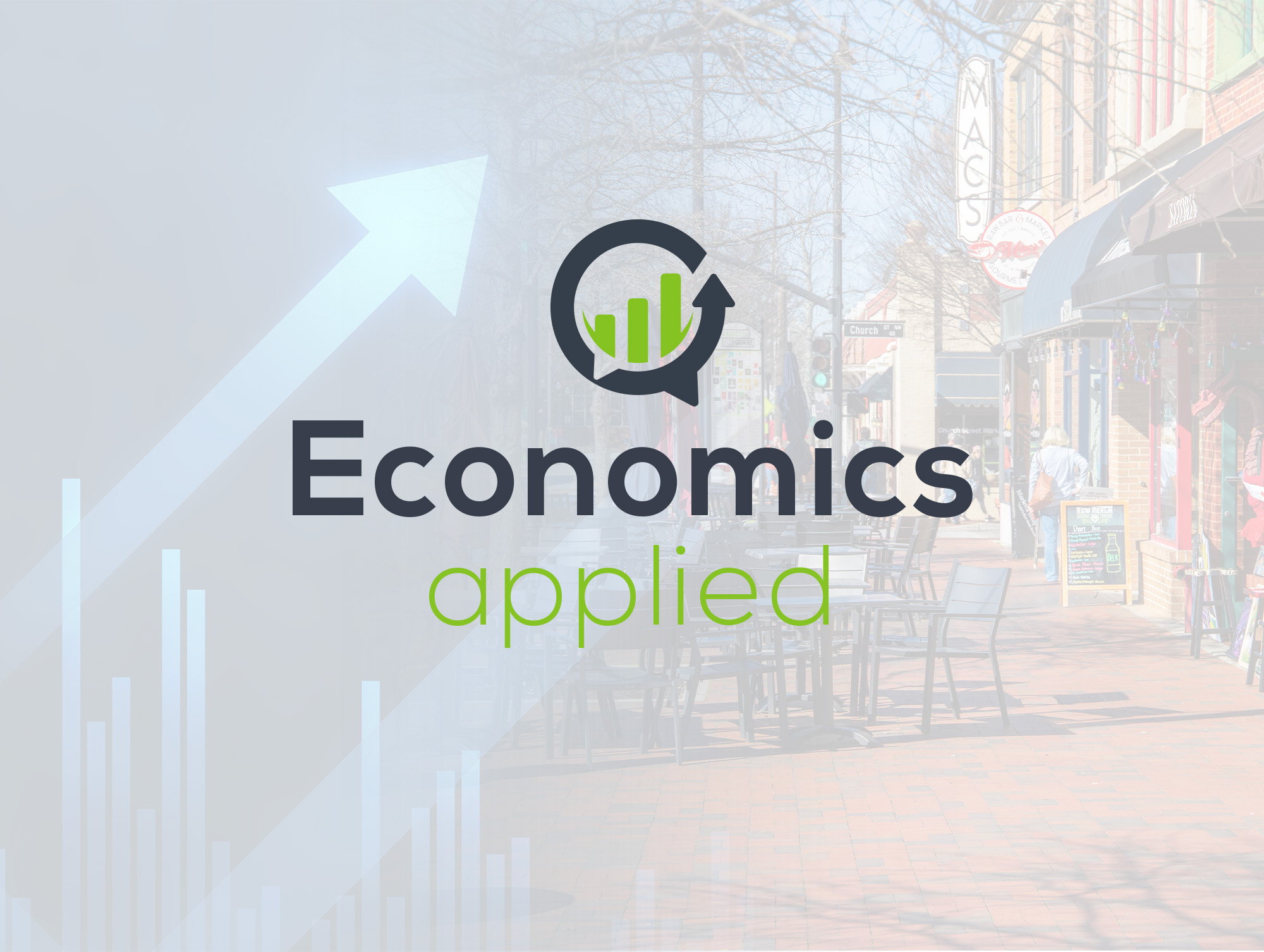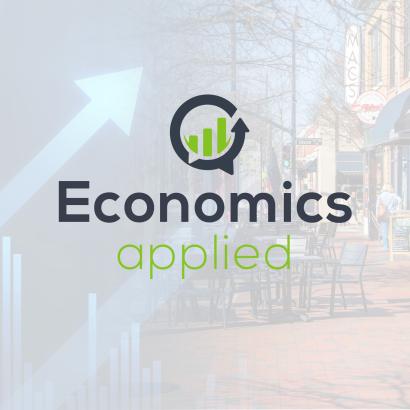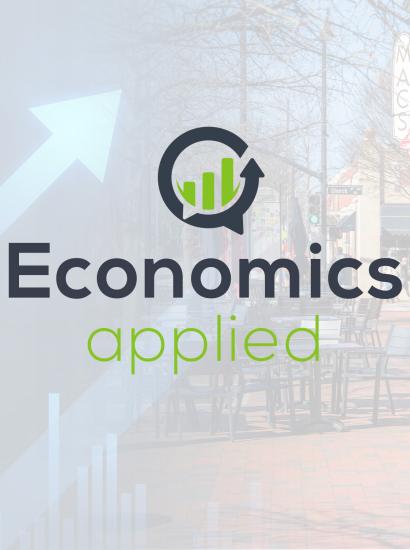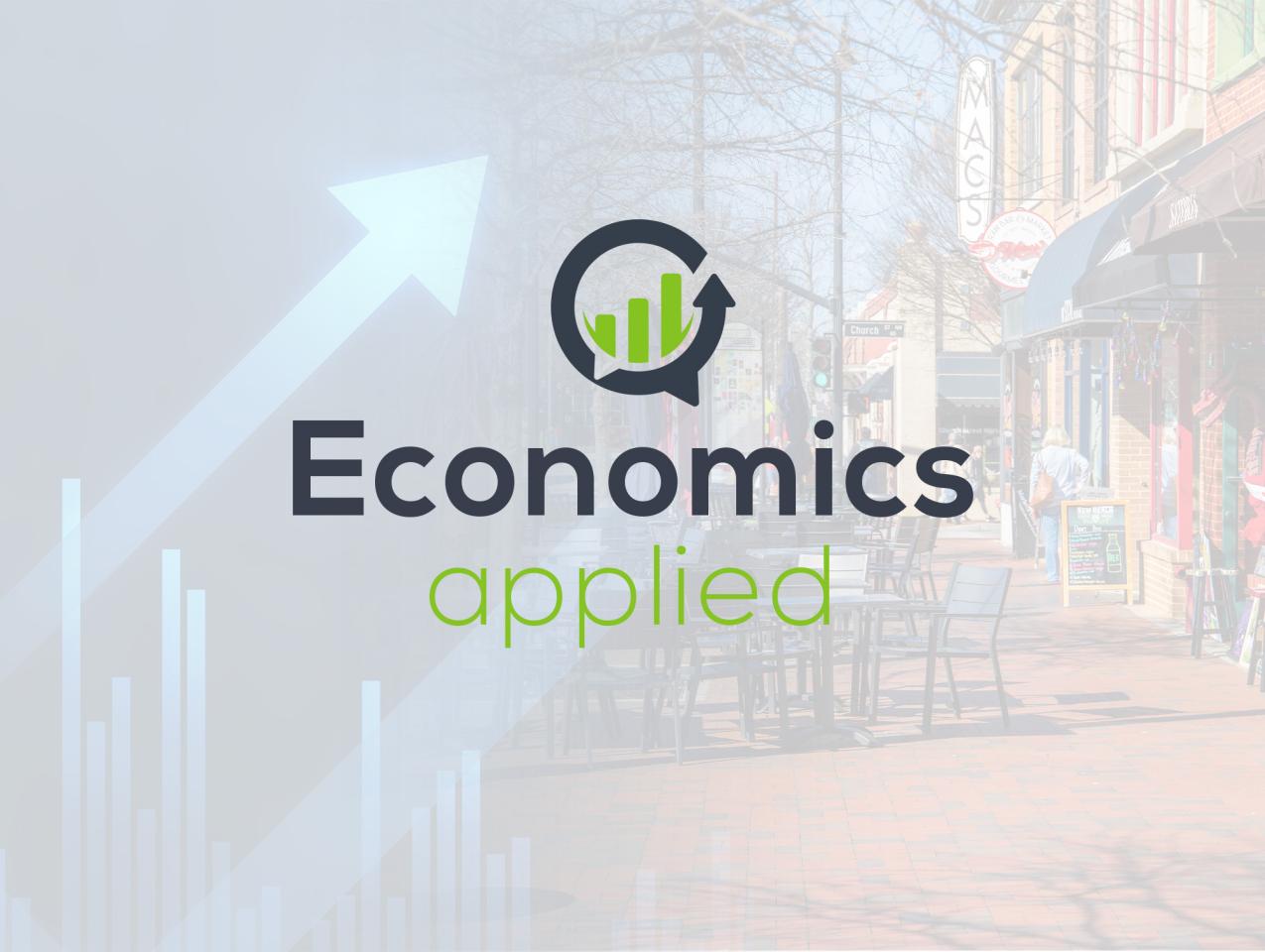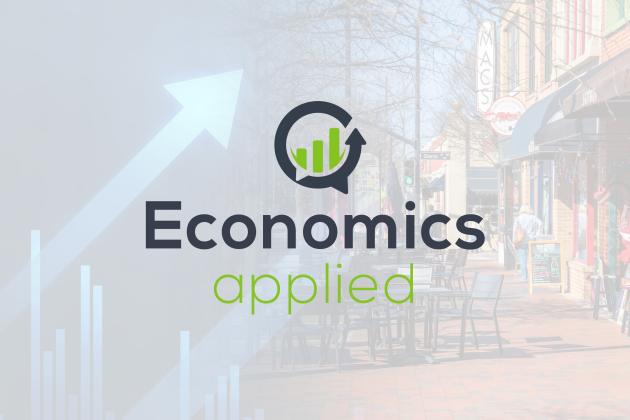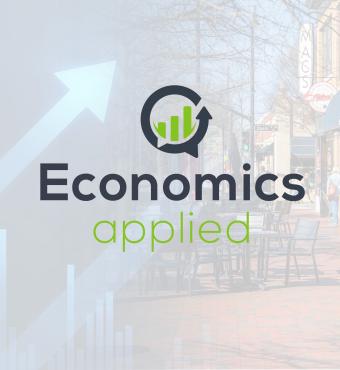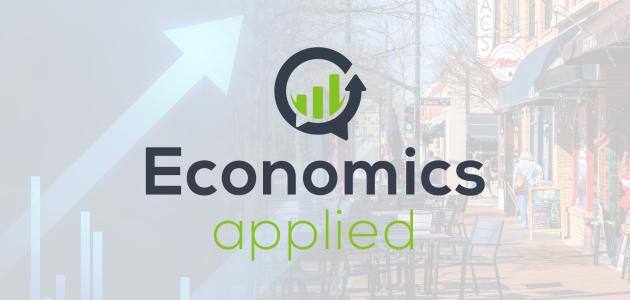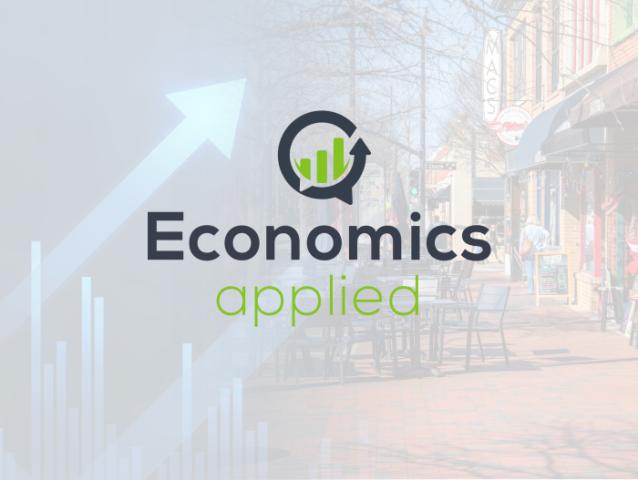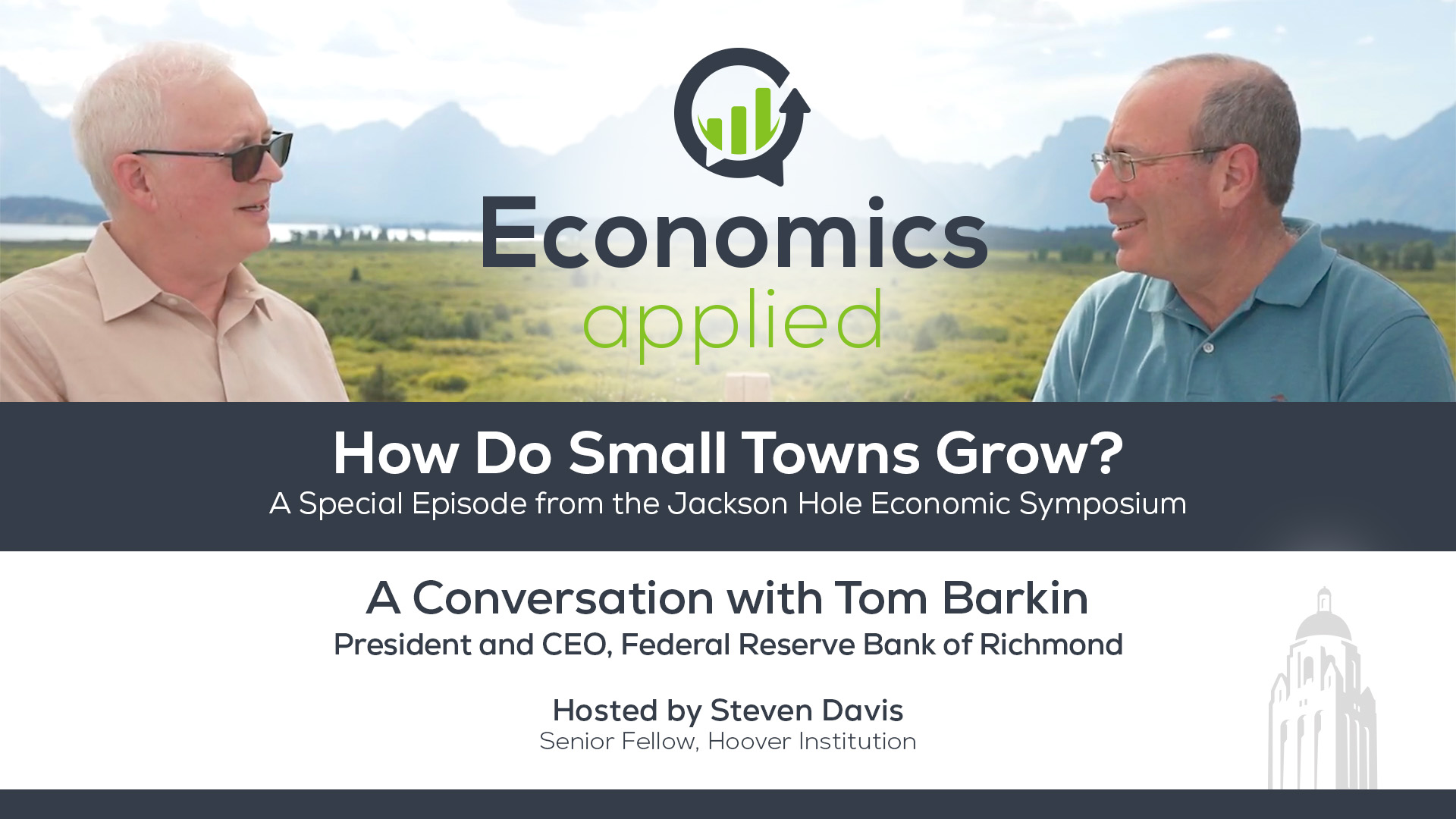- Regulation & Property Rights
- Innovation
- US Labor Market
- State & Local
- Answering Challenges to Advanced Economies
- Understanding the Effects of Technology on Economics and Governance
Richmond Fed President, Tom Barkin, joins Steven Davis to consider what it takes for small towns to prosper, and why it matters for families and communities. They also discuss how policymakers and civic leaders can address concerns about the downsides of economic development.
- Welcome to a special edition of Economic Applied. I'm here with Tom Barkin, he's the president of the Federal Reserve Bank of Richmond and a member of the Federal Open Market Committee, the FOMC, which sets monetary policy for the United States. Welcome Tom.
- Great to meet you.
- And thank you for making time. You could be whitewater rafting or hiking the mountains. Instead you're here speaking to an economist. So late
- You, you, you didn't tell me I had those choices now, now I really should have done something else. Yeah. So, but at least we're outdoors. Yes. This is beautiful here.
- I want to talk about small towns in America and you know, I, you gave a speech back in May and I think it was titled How to Small Towns Grow. And it caught my attention and I think many people would like to know the answer to that question. So that's what I want to talk to you about today. And maybe you can first just tell me what drew you to that question, how you approached it, you know, what kind of sources of information and analysis did you draw upon? And trying to answer this question of how to small towns grow small.
- Well, so lemme take you back seven or eight years when I took this job are we have a dual mandate, stable prices, maximum employment. And so I asked my team, you know, what's the right metric of maximum employment? We kicked it around for a bit and we said, employment to population or employment to primate population who's employed and who's not. I said, okay, where in our district is that highest and where is it lowest? And I was kind of surprised 'cause the outcome was it's the small towns that are the lowest. It is the big cities that are the highest. And I wasn't surprised that the suburbs would be high, but even if you took the big city in total, including the inner city, their employment to population was 10 to 12 percentage points higher than it was in the small towns.
- Okay, interesting.
- And so we started visiting small towns. We care about maximum employment, we ought to visit small towns. And, and then what you heard over and over again was the story of flight that kids grow up, they don't see a future there. They go to the big city, you've got demographic issues, therefore with only the old people stay, you've got all kinds of issues in terms of workforce. Companies don't want to come there. And so it seemed like a really big issue to ask the question. And the way we put it in the small towns is what would it take to get your kids to stay or to come back. And that, that, that speaks to small towns at a very emotional level who doesn't want their kids right. To have back. And so we've been visiting small towns for seven or eight years. We've done a lot of research on 'em. And one thing my team found about two years ago is coming outta COVID, this story of small town decline. Actually it started to shift, it had been an increase in population in a bunch of small towns. Now, not every small town, and I like to say not every small town's gonna grow. And, but there were a lot and you know, just some comparative data. If you go back to the 22 thousands, you had most of the small towns in this country shrinking. If you go to the 2010s, almost none of them grew in the 2010s. You had most of the small towns growing.
- And now 2020s as you mean
- In the 2010s, you had most of the small towns shrinking. Sorry.
- Yeah. So shrinking in,
- And then in the 2020s we're seeing about a third of the ones in my district growing. So that's very interesting. And you know, we started going to these small towns and asking, you know, what is it? And, you know, doing some more analysis and you know, you, you'd put it in three segments. And then I'll come back to what does it all mean, one segment, which makes sense, but you have to think about it is excerpts. And so if you go outside of Raleigh, an hour outside in Wilson or Smithfield or Rocky Mount, you'll see thousands of houses by the big home builders being built at $250,000 each. So you've got a lot of people moving into those houses and around Charlotte, around Greenville, around Raleigh, around Richmond, you're seeing a bunch of housing being built and a bunch of people moving there. So that's one piece. How much of this is tied to the rise of remote and hybrid working? I absolutely think it's driven to, okay. Availability of hybrid and the importance of housing. Right. And I think you've got a bunch of people not able to find houses they can afford in the city that they lived in who are now ready to buy a $300,000 house. They can afford that. Right. But the only place they can get 'em is an hour outside. And they couldn't have made that work 10 years ago. And of course you've done a ton of work in this, but they could've made work 10 years ago when they couldn't make the commute work. But maybe you're going in twice a week or maybe you're going in not at all.
- Okay.
- And now you can find a place to live so
- That, so if the exurban areas are willing to provide additional housing, there's a ready source of demand for the people who have these expanded opportunities to work remotely, either all the time or just a couple days a week. It helps a lot.
- Absolutely. And you said it, not every one of these excerpts wants to add a bunch of housing. Okay. And that's where it gets really interesting because this whole NIMBY thing is real. Yep. And there are a lot of communities out there that are saying, no, I like my farmland, I like my rural community. I don't wanna have all these people move in. Now at the same time they're saying, I kind of wanna bring back the, the restaurant that was in the main street. Those things actually go together, populate
- To the, that's the thing. It's hard to have one without the other sometimes.
- Exactly. - He's like, you want rich amenities, you have to have some economic and population base to support that.
- So we find, you know, in Exurban Baltimore, you drive around and you find places that are growing and you know, people are very excited about the amenities, not that excited about the growth. Right. You see other places where they put up the barriers and you're not seeing the amenities. So I think they really do go together. And so that's one set of small town. The excerpts. A second one, which again will make sense also related to hybrid is high amenity places. Yeah. And here I'm talking about beaches, I'm talking about lakes. I'm talking about Jackson home near Jackson. No, I mean, yes, Jackson Jackson's grown massively as a small town. Places people wanna live. Right. Tends to be more. But even as upscale people will need, you know, workers to do stuff. And, and again, the availability of remote work is relevant to this. The third, just to get off the table is there are still places that attract industry and grow. So that's the historic thing. I think the thing I took away from it though is most small towns think about economic development as I have to go find the jobs. And I actually think it's really interesting to think about, I have to go find the workers. Because when you talk to manufacturers about where they're gonna locate, they want an available base of workers. So if you turn it on its head, you say small town growth is about attracting people as opposed to attracting jobs. And in this new remote hybrid world, people can travel for the remotely. And part of
- Part of attracting the people is back to the amenities piece. And it's not just about the restaurant downtown. Absolutely. It's about good schools, safe, clean streets, basically things that make people wanna live there and hang out there and feel safe and secure.
- Childcare, transportation.
- Yes.
- Absolutely. And, and then you'll find some small towns, and I mentioned Wilson earlier, it's a neat little small town in eastern North Carolina, roughly an hour from Raleigh. Guess what? They've got a new, a minor league baseball stadium. They're all excited about that as a, as an economic development thing. There's been a lot of streetscape done in the downtown to make that a more attractive place to live. I told, talked about the housing, that's another piece of it. They've even done a pilot with, I'll call it an uber-like vehicle to take their, their Medicare and Medicaid funding, you know, for transportation. Hmm. And turned that into more of a ri a subsidized ride share. I see. Process. So people who couldn't get to work or get to hospitals or get to schools could actually access ride share and go. So I think there's a lot of innovation going on to make these places attractive.
- It's early yet in to, to analyze the how these post COVID developments have played out. But what's your sense are the communities that decide that they're going to be hospitable to housing policy and otherwise to a population inflow of some sort? Is it largely being successful from what you've seen? Or are there cases where it's failed and people really regret it?
- I, I think very successful. I've not seen a place that's overbuilt Okay. For housing. And I guess this is just one of those I, I keep, you know, of course in my day job I get asked when are mortgage rates gonna come down so we can all buy a house? And I keep saying the problem isn't the, the demand for housing, the problem is the supply of housing. Right. And you know, we underbuilt for 15 years after the great recession, that was part of the great recession. Loss of construction people, loss of developers, banks not being interested, regulators not being interested. But we didn't notice it till we got through the COVID period. And we're now massively short in terms of housing. So I think if you build it, they will come.
- Yeah. On this point, and I, I don't know whether it's true in your district, but there are certainly parts of the country where new housing supply has been restricted by zoning requirements, building costs and so on. I mean, I live in California. I live in one of the most expensive real estate markets in the country, if not in the world. And partly it's because it's very expensive to build and very hard to build. And this NIMBY phenomenon that you described isn't just occasional communities. It's the norm. Yeah. The desirable parts of California. So how do, how do you deal with that problem?
- So one thought experiment I like to do, and that's it's a real experiment, is to cross state lines. So if you drive south from Norfolk into North Carolina, you'll cross the border and you'll see a ton of housing. If you drive south from Maryland into Virginia, you'll cross the boarding. You'll see housing similar if you go from Maryland to Delaware or West Virginia. And that tells you something. When the state border matters something, it means there's something about, it's not just land, it's all set policy. So there's a piece to this, which is policy. And there's a long conversation we could have about, you know, permitting costs and infrastructure deployment and just certainty in terms of getting stuff built in a world where environmental or other reviews can hold things up. You hear lots of those kind of stories. The second piece, which sounds obvious, but I'll just put it to it, is land. If you, if you think about how much in most communities housing is mispriced versus demand, it's about 20%. That's the cost of the land. And if communities wanna do something, making land available is a very interesting idea. Now, here's where I get a little bit more controversial because once you start thinking about land, you can't get it outta your mind. And so I start driving around, I drive into community college campuses in, in my states, and I see massive beautiful drive. You know, drive ups in no dorms. And why are there no dorms? Well there's actually laws in many of these states to say you can't build a dorm at a community college. Well why is that? 'cause they don't want competing with a four year college. But there's land, the student housing developers will build dorms there. If you build dorms there, you'll then open up a bunch of houses that students are living in.
- Right.
- You go to,
- That's an interesting example, a very micro one of, of how we adopt policies perhaps for some other reason.
- Yeah.
- Good or bad. But it inhibits the development of residential housing.
- If you go to the small towns, the small towns will also say they don't have any place for housing. And then you say, well that's kind of crazy 'cause you've been losing population for years. Why you have housing. And the answer is, in most of these small towns, there's infrastructure lots that are vacant or have old, dilapidated houses in there owned by people's kids who no longer live in the community.
- Hmm. - And those communities that actually take that on as a task, how do I get that land redeployed for development are having lots of success. Some of that is about how you tax underutilized land or how you enforce dilapidated housing restrictions. Right. Or even how you use public money to fund and buy some of this places. But if you really wanted to have more housing in your community, you'd have to buy this land. Right. One way or another. There, that's a second version. A lot of big cities have closed a lot of schools as the school age populations come down, they've got government buildings in excess, they've got government land in access. Why are you using that for housing? And so if there's a all in way, we actually have to think about this. Right? Then you start coming to land. And I think, you know, part of it's permitting and policy, but part of it's availability and use.
- And it's just worth noting. It's an obvious point, but it's important in this context. United States is not a densely populated country per square mile compared to the much of the rest of the world, including many other rich countries. So there's not a scarcity of land in some overall sense. It's, you gave some examples of how land gets tied up. Land that could be used for housing gets tied up in other uses or restricted in some ways. We've really kind of tied our own hands, I think
- A lot. And infrastructure's an issue too. And a lot of this land, if you drive down into the interstates in my district, you'll see massive amounts of land. It's not infrastructure. Well then you talk to the economic developers and they've got a gorgeous flat piece of land, a hundred acres, which they've pre infrastructure 'cause they wanna attract a factory. They call it a buildable site. I go, well, why aren't you doing a buildable home site? Right. I mean, you, you funded it right? Because they care more about the jobs than the workers. But I think that's where we've gotta make the move.
- So let, let me, let me put two questions to you. And they're, they're related as you'll see. And I, I want to get your answers. So let's say I'm a, a committee of concerned citizens or a local chamber of commerce, and I come to you and say, Tom, you know, you've been studying this issue. You've seen successes, you've seen not failures, places that didn't grow. I want two pieces of advice for you, and you've already covered some of this on the first question, what should we do to help our small town grow? Maybe the easier question, harder question is, how can we get the people who are opposed to growth in the local community or who are really concerned about it, how can we get them to buy into this idea? So gi gimme your answer to those two questions.
- So in the first one, you know, with the small towns really don't have, as developers, they don't have people who are skilled at building at some scale and, you know, motivated to do it. And in some cases developers have been a bad word. But I kind of think you're competing for developers. And I was in a, a community in Northern North Carolina that actually, you know, did a town fair, a ha a fair, had an open fair for a bunch of developers to say, now wait a second, why wouldn't you come here? That's a totally different mindset. But I think if you say, as a community that I'm competing for developers, then you start to think about land and availability and cost. You start to think about permitting and certainty and infrastructure and all the rest.
- That's a, that's a really slick idea because you also then hear from the developers about what it is
- That they
- Need to, that will, that they need to make this work. So yeah, that's a very interesting idea.
- And and don't forget, we're short construction workers right now. There's a lot of competition from materials coming from data centers and the like, this is still a tight construction market. And so developers can go lots of places, right? So that, that, that's one piece on how to communicate with the community. I've been really taken by counties that have decided to declare infrastructure quarters and agrarian quarters. And so what they do is they zone their county and say, we're gonna put the development here and we're gonna preserve the rest of it there. And that seems to work. Carroll County, Cecil County, Maryland is one that occurs to me. That seems to work pretty well because in a lot of these more rural counties, you don't need to build in all of it. The eastern part is really close to a big city, but the western part is not. And the people in the county care about the character of the county, but they wanna get some conviction that it's not gonna be everywhere. Traffic's not gonna be a disaster. And so the notion of quarters to me, you put infrastructure in, you can find the development. It seems very interesting
- That mixed, mixed reactions to that one. For one thing, it, I'll explain why it puts the allocation decision. Yeah. Where you put land use squarely in the political process rather than so much through a market process. Now I see the argument, you might not just wanna let development hap happen willy-nilly, but something that's in between that is, is a county or whatever other locality could say, look, we're gonna set aside 20% of the space Yeah. In our county for development, but we're gonna auction it off, which is not, which is kind of getting, you know, a little bit closer to the market mechanism in terms of deciding where to develop, even though you're still allowing some role for the political process to decide how much development occurs. 'cause you know, and the other thing I wanna say about this is the, the proposal you put for, well let, let me stop there and I'll come back to the other one. Go, go ahead
- And just be, I'm describing what others do. Yeah. Here's an interesting idea. You know, you have to make, you have to recognize that most of the land that they're zoning is private land. And so they're not auctioning it off. And so to support what you're saying by changing the zoning on it, they're making this guy's stuff more valuable and this guy's stuff less valuable, which you
- Made. Well that's the thing I was just made it come with, that's a very political process with winners and losers. So if you do it all through the market process, some guy who's got a farm and he's just on the, he's just on the agrarian side of your, your, your line and he's kind of wanted to retire, well, you know, maybe his land's only worth one fifth, I'm guessing what it would be if he was on the development side. So then that's a, that's a big
- Deal. I like your thought and then we'll just have to figure out how do you avoid it being the kind of unmanaged growth that leads to Yeah. Politicians getting voted out. Interestingly, I can talk through cities where they've done a great job on what I'm talking about, and then the politicians get voted out, which as you know, is not really high on a list of the ambitions of politicians. So, so I I'm, I I'm very interested in exploring further how you might
- Structure it. Yeah. We, you recognize this, but it's, I should state it explicitly for the record, land use is a tricky matter. You know, you want, you want a big role for the, for market mechanisms, but they're also in the language of economists, there are spillovers or externalities. You know, if I've got my beautiful house that I've invested a lot in, I don't want a garbage dump absolutely. Suddenly put up next to me. That's kind of an extreme example, but there are many less extreme examples of that. So it's, it's an area where you, there's an important role for market forces, but probably you don't wanna rely on completely unfettered market forces.
- Yeah. - So it's a tricky, it's a tricky in-between area.
- Okay. You've given something to think about,
- Tom. You know, we, we've chatted a lot about how to make small towns grow, why some communities want their town to grow, why some don't, you know, you had some really interesting ideas, but I wanna widen the lens a little bit and for, for my last question and ask you, if you think about it from the perspective of the country as a whole, from everybody who's living in the United States, you know, why is it important that small towns be able to grow and thrive? What, what, what, what's the, you know, why do we care about that if we're not a small town person?
- Well, I guess I'd start where I began, which is we do care about maximum employment in this country. We're gonna be short workers, I believe for the next 20 years. Demographics, fertility, immigration. And so we need all the people in the workforce we possibly can,
- Including the ones in small towns who have this low employment population. Exactly. If you're, if you're 10 to 12, I like, I like that in the question of how we get more people. That's good idle resources are not good for Absolutely. The, the economy as a whole in the country as a whole,
- Same for political fabric of the country. It's not healthy to have parts of the country more successful against that metric than others. It's better to have, you know, more people. Yeah. Yeah. So I think, I think that's good. I, I'll say for the people in small towns, and interestingly as I've done this, you know, in our big cities, a huge percentage of our big city people came from small towns. This is, this emotionally resonates with people Yeah. In big towns as well. You know, everyone wants, likes the idea of going back where they grew up and thinking that there's a potential there. And I think there's just something fundamentally positive about that. I will say not every small town is gonna do it. If you go back to, to my district, you know, there used to be a highway called 3 0 1, it still exists, but that used to be the north south highway. Right. Then they built 95, which is an interstate. And so there's some towns that made their name because they were on the train tracks or on the 3 0 1.
- Right.
- That are not on 95. That's harder if you're not on the, so I think if you sort of say every small town has to grow, that's, that's not right. And not every small town wants to grow. So to me this is more about you're in a town, you've got some aspirations, you get the community together, where's the hope for us? And I, I think there is actually
- Yeah.
- Enabled by remote work, I'd say reinforced by this desperate need for affordable housing, attainable housing that a lot of people have. Right. I think it's, it's sort of a, a moment.
- Okay. Yeah, that makes sense to me. Okay. Well thanks so much Tom. That was a great conversation. Yeah. Really, really enjoyed it. Now you can go out and do your whitewater rafting or whatever, since you know about it now.
- Exactly. I'm in. Thank, thank you Steve. Great being with you.
ABOUT THE SPEAKERS
Tom Barkin is President and CEO of the Federal Reserve Bank of Richmond and a member of the Federal Open Market Committee (FOMC), the Fed’s chief monetary policy body. Previously, he was a senior partner and CFO at McKinsey & Company, where he also oversaw McKinsey’s offices in the Southern United States. He holds bachelor’s, MBA, and law degrees from Harvard University.
Steven Davis is the Thomas W. and Susan B. Ford Senior Fellow and Director of Research at the Hoover Institution and Senior Fellow at the Stanford Institute for Economic Policy Research (SIEPR). He is a research associate of the NBER, IZA research fellow, elected fellow of the Society of Labor Economists, and a consultant to the Federal Reserve Bank of Atlanta. He co-founded the Economic Policy Uncertainty project, the U.S. Survey of Working Arrangements and Attitudes, the Global Survey of Working Arrangements, the Survey of Business Uncertainty, and the Stock Market Jumps project. He also co-organizes the Asian Monetary Policy Forum, held annually in Singapore. Before joining Hoover, Davis was on the faculty at the University of Chicago Booth School of Business, serving as both distinguished service professor and deputy dean of the faculty.
RELATED SOURCES
- How Do Small Towns Grow? Tom Barkin's speech at the Investing in Rural America Conference, 20 May 2025
- Tom Barkin’s webpage, Federal Reserve Bank of Richmond.
ABOUT THE SERIES
Each episode of Economics, Applied, a video podcast series, features senior fellow Steven Davis in conversation with leaders and researchers about economic developments and their ramifications. The goal is to bring evidence and economic reasoning to the table, drawing lessons for individuals, organizations, and society. The podcast also aims to showcase the value of individual initiative, markets, the rule of law, and sound policy in fostering prosperity and security.
For more information, visit hoover.org/podcasts/economics-applied.







